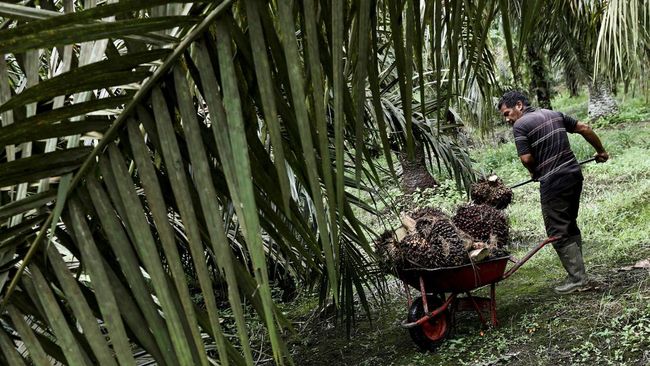Indonesian Farmers Union reports palm oil sales results ahead of Eid which ends up losing money due to the export ban CPO implemented by President Joko Widodo (Jokowi).
“Towards Eid yesterday, farmers who hoped for a good price, actually destroyed the price because they could only be sold for half the usual price,” said Chairman of the Indonesian Farmers Union Henry Saragih to CNNIndonesia.com, Saturday (7/5).
He explained how the ban on CPO exports made the price of Fresh Fruit Bunches (FFB) or production costs at the farmer level drop drastically, even before the policy was officially implemented on April 28.
“With the ban on CPO exports, as soon as the President announced a week before the 28th, the price of Fresh Fruit Bunches at the farmer level fell drastically, between 30 and 50 percent,” said Henry.
He revealed that previously the FFB price exceeded IDR 3,000. Now, the price has been cut by 50 percent to Rp. 1,500. There are also those who failed to sell because the price did not sell.
“So now the fact is that the price of cooking oil has not fallen, the price of agriculture has gone down. So, that is what we think is very fatal,” he said.
Previously, observers had predicted that the policy of banning the export of crude palm oil (CPO) would also harm farmers who depend on exports for their income.
According to the Executive Director of the Institute for Development of Economics and Finance (INDEF) Tauhid Ahmad, farmers have the potential to lose the market because the majority of Indonesia’s production is exported.
“Who buys it? We have millions of farmers who have to depend on the export market,” he explained.
He also suggested that the government should limit and not prohibit. This is because domestic consumption of CPO is only around 6 to 7 million tons.
“Domestic consumption is only 6-7 million tons, but 30 million tons are prohibited from being exported. Where do you want to go? Is it rotten?” he said.
President Jokowi began banning the export of cooking oil raw materials such as CPO and cooking oil starting April 28. Jokowi said the decision was taken with several considerations.
One of them, the government’s failure to overcome the spike in cooking oil prices in the last 4 months. The price of cooking oil has indeed jumped sharply from Rp. 14,000 per liter to around Rp. 20,000 since the middle of last year.
Jokowi acknowledged that the export ban could have a negative impact. Prohibition can harm farmers because their crops have the potential to be unsold.
In addition, he said, the ban also has the potential to erode the country’s income and foreign exchange. But whatever it is, said Jokowi, a decision must be made.
According to him, meeting the basic needs of the community is the main thing. Therefore, he asked the palm and cooking oil industry players to support his move.
(tdh/pra)
–


